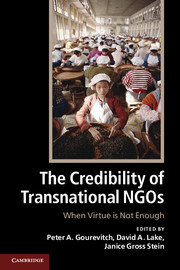2 - Why believe international election monitors?
from Part I - Monitoring and NGOs
Published online by Cambridge University Press: 05 June 2012
Summary
When are international election observers – including NGOs such as the Asian Network for Free Elections, Carter Center, the International Republic Institute, the National Democratic Institute, and the Electoral Institute of Southern Africa – credible sources of information on the quality of elections in sovereign states? Following Chapter 1, I show that election observers are more likely to be credible when there is a perception of common interests between the audience and the monitor, observable costly effort by the monitor or the target, penalties on the monitor for misrepresentation, or external verification of the monitor’s reports. Each of these variables is discussed in greater detail below. I also outline how election observation organizations employ various strategies to increase their credibility and how the absence of such strategies can reduce credibility. These strategies include integration with the community of other election observer organizations, promoting shared values among these organizations related to best practices, professionalizing election observation, adopting governance structures that signal their independence from states that invite election observation, and increasing transparency in the governance, funding, and methods of election observation.
Before discussing how and why some international election observers have become credible judges of election quality, I first introduce international election observation in the context of this edited volume, explaining the demand among democracy promoting actors for improved information on elections, and outlining why leaders now invite foreign election observers even when their elections are likely to be criticized. I then discuss variation in the credibility of election observers and the correlates of credible election observation. A number of more general empirical implications are outlined, but the central evidence is based on a case study of the Carter Center and its efforts to maintain credibility, and the comparison of this book’s theoretical framework to existing findings on international election observation.
- Type
- Chapter
- Information
- The Credibility of Transnational NGOsWhen Virtue is Not Enough, pp. 37 - 61Publisher: Cambridge University PressPrint publication year: 2012
- 11
- Cited by

